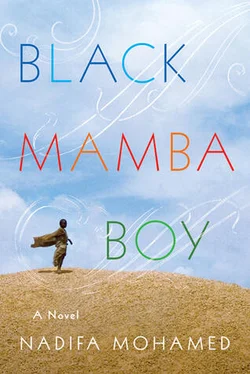Jama wanted to ask Jibreel if his father had ever explained why he did not send word to them or ever visit but he became embarrassed and instead asked, “Isn’t he a driver?”
“Maybe. You need identity papers and money and other things, we all left home with only the clothes on our backs, maybe in Gedaref it’s easier. A group of them disguised themselves as Sudanese traders and snuck off in a truck, pissed off with the Italians and their stupid white-man, black-man laws. They want you to step into the gutter when they approach, say master this and master that. I think Guure left just after he saw an Italian sergeant make two askaris drink his piss as a punishment. That’s the way here, it’s not a life but it’s better than death, but good on Guure for getting out… The longer you stay, the less of a man you become.” A sleepy soldier repeated this dozily after Jibreel.
Jama’s appetite for information grew as it was fed. “What does he like look?” he asked with bright eyes.
“He is smallish, stocky, looks young for his age, your kind of brown, he has a big head, strange yellowish hair, strong arms, big teeth like you.”
Jama’s face contorted as he tried to picture his father, but the image was too sketchy to be satisfying, and not as handsome as the man in his fantasies.
Jibreel laughed. “Don’t tax yourself, you’ll soon be able to see him with your own eyes. Your presence here is big news, so it won’t take long for someone to reach Guure and tell him you’re on your way. It’s unlikely he will be able to get back here — they don’t take kindly to deserters — but we will have a collection and see if we can help,” he said with a wink.
Jibreel put a cigarette to his mouth and Jama watched the way he held it between his lips, struck a match, and let tendrils of smoke escape from his nostrils as he inhaled. “Let me have a try.”
Jibreel handed the cigarette over with an amused smile; Jama put it to his mouth and sucked too hard, smoke shooting up his nose, singeing all the soft membranes. His eyes watered terrifically and his lungs burned; it was as if he had shoved his face into a thick fire. Jama stifled his coughs and shamefacedly handed back the cigarette.
Jibreel continued to laugh at him, so he returned to his tent and chewed over everything Jibreel had said.
As a frontier town, nestled between the borders of Abyssinia, British Sudan, and Eritrea, there was wildness to Omhajer. Every day some askaris would arrive while just as many deserted. It was the Wild West of Eritrea. Jibreel told Jama of the suffering he had seen. Refugee women and children picking undigested grain from cow dung, emaciated men with bodies like mobile skeletons sitting on the road and expiring, their eyes wide open. Gunfire occasionally rang out from the checkpoint and the prison before it was drowned out by market trader calls and donkey brays.
One day, a week after Jama had arrived, Jibreel appeared dusty and panting, but the herald of good news. “I have just received a message from Guure passed on by a returning Somali merchant. He has become a lorry driver for Ilkacas, a Habr Yunis man in Sudan. The merchant told Guure that you were here in Omhajer.” Jibreel took Jama’s shaking hands in his. “Your father is coming to pick you up.” Jama’s heart fluttered around his rib cage as he drank in this blissful news. He grabbed hold of Jibreel’s waist and squeezed him tight, unable to communicate his joy in another way.
“Let go, Jama, I can’t breathe.”
Jama loosened his grip but held on, imagining Jibreel’s lean body was his father’s. Finally Jibreel pried Jama off him and together they looked for askaris to tell the good news to. They handed over celebratory cigarettes to Jama and shook his small hand, Jama could not sit still, could not eat, he laughed hysterically at the askaris’ jokes and grasped them in suffocating embraces. Jama thought about the gifts his father might bring, the stories he would tell, the songs he would teach him, and stayed awake all night.
Lorries came and went regularly from Sudan, with supplies of cigarettes and other necessities, but still his father did not appear. Each day was an ordeal of waiting, each minute, every hour was not fully lived because his heart was suspended between hope and despair. He hung about the main thoroughfare, teetering around on tiptoe, staring into the cabs of arriving lorries.
Jama scrutinized the place his father had tarried for so long. It was a khaki kingdom, with absolutely no women to be seen anywhere. Italians stomped around, their skins tanned to nearly the same color as those they professed to be civilizing, whips made from hippopotamus hide hanging from their belts. Somali soldiers, some young, some approaching middle age, some polite, some rough, greeted him as he passed. Nearby, ancient black veterans from the Italian defeat at Adwa in 1896 sat begging, an arm and a leg amputated by the Abyssinians to punish their disloyalty. Jama walked all over the small busy town, avoiding the more secluded alleys and lanes, before returning to the tent with a handful of sultanas and peanuts pilfered from a Sudanese merchant. Each day he got up at dawn and followed askaris around until sunset. His clansmen made him a communal little brother, patting his head and giving him puffs of their cigarettes. They all knew his father and could recount memories of him. He would be passed on from one askari to another like a pack of cards, only returning to his mat at night, when the booze came out and the soldiers favored more adult conversation.
One windy afternoon, a few days after the news from Gedaref, Jibreel entered the tent, his dark face ashy, and he stared at Jama for a moment. “There is someone here to see you, Jama,” he said.
Jama trotted by Jibreel’s side, kicking pebbles out of the way and waving to his friends, his face burning with white-hot joy. Jibreel was stiff and silent beside him. Jama tidied himself up, spat on his dry white elbows and knees and fluffed up his hair with his fingers. Jibreel’s eyes were wide and shiny; Jama saw the reflection of a flock of crows taking flight in them. A man spilled a basket of lentils as Jama passed, and crouched down to scoop them up, while a group of Somali askaris stood nearby smoking.
“Wait here, he’s coming,” mumbled Jibreel, before joining the other askaris. The minutes ticked by as long as days, the sun’s heat felt like a heavy weight on his head, Jama prayed for his father to hurry up, the Arabic words muddling in his mind as mosquitoes buzzed beside his ears. A man came over the horizon, a small cardboard suitcase hung from his fingers. Jama took tiny steps forward. As the man approached, Jama’s heart sank as he looked up and saw a middle-aged, gray-bearded man staring down at him. His skin was a creamy light brown and he wore a red fez perched on the side of his head; his stomach hung a few inches away from Jama’s face. This was not the man he had imagined.
“As-salamu alaykum, Jama, forgive me, but I come with unfortunate news. Guure’s life has ended, he was on the road from Gedaref when he ran into a military roadblock. He owed a favor to the godforsaken Sudanese merchant who had helped him desert the army, and was carrying weapons to sell to the patriots in crates hidden in the cab, as the Italians neared them he panicked and tried to flee. They shot him there and then. We buried him yesterday in Gedaref. We all live on borrowed time and by the decree of Allah-Kareem, Guure’s time on earth has passed. It was not his fate to see you. Here are his belongings. May Allah have mercy on you.” The man’s words swam around him without meaning. They sounded like the crashing of waves or the gurgle of blood to him, their substance broken up and diluted. Jama crouched down on the dirt, covered his ears; he couldn’t breathe, grief had stolen the air from his lungs, drained the blood from his veins. He clawed at the earth to bury himself.
Читать дальше
Конец ознакомительного отрывка
Купить книгу












